Tomatillos. Collard greens. Tilapia. Black-eyed peas. What do all these items have in common? Well, for one, they’re all pretty darn tasty when cooked. They’re also all part of the new Culturally Responsive Food Options pilot at the Food Bank – CROps for short. Every week, participants at Cesar Chavez Pop-up Pantry and Rosa Parks Pop-up Pantry, in the Mission and Western Addition respectively, are presented with two additional food items that they can choose to take home, or decline.
Creating a More Welcoming Pantry
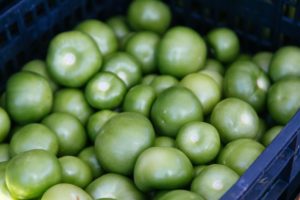 CROps is an effort to provide more culturally responsive foods and more choice for our Black and Latinx participants, By supplying culturally relevant items people like and know how to use in the kitchen, this pilot hopes to increase satisfaction with the food choices offered, help us learn more about what people like and want to see, and create a more welcoming pantry environment.
CROps is an effort to provide more culturally responsive foods and more choice for our Black and Latinx participants, By supplying culturally relevant items people like and know how to use in the kitchen, this pilot hopes to increase satisfaction with the food choices offered, help us learn more about what people like and want to see, and create a more welcoming pantry environment.
Some community members like Cliffton at Rosa Parks Pop-up Pantry are also eager at the prospect of influencing what foods may appear next: “it’s a wonderful thing, to have a survey to see what the community wants. I got the email, and I will be filling it out.” Surveys among participants helped decide what foods went into the first few weeks of the pilot, and now participant feedback will help decide what items are offered going forward.
Community Response
So far, the items seem to be striking a chord with participants. Victoria, a participant at Rosa Parks Pop-up Pantry, cooks for herself and the older gentleman she cares for. On the day we spoke, she had picked up both add-ons: green onions and white mushrooms. 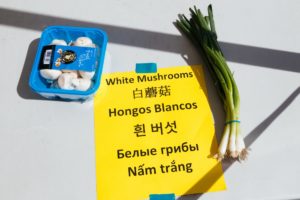
“Sometimes I don’t know the vegetables that they give out here, so the new items have been great for me, because they’re things I’m familiar with and already know how to cook. I know what I can do with them,” said Victoria. And what does she do with them? “I cook about as much Mexican food as I do food from my country – El Salvador. So, the green onions are great to make a carne asada, or a carne entomatada.”
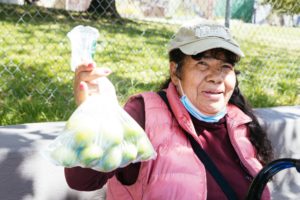 We also caught up with Maria at Cesar Chavez Pop-up Pantry, who is recovering from an operation on her stomach to remove a tumor: “I can’t eat out – my stomach is really fragile from the operation. Street food makes me sick. So, I need to cook at home, for my health.” New food and spice choices, like tomatillos and oregano, allow Maria to make comforting foods that aid her recovery.
We also caught up with Maria at Cesar Chavez Pop-up Pantry, who is recovering from an operation on her stomach to remove a tumor: “I can’t eat out – my stomach is really fragile from the operation. Street food makes me sick. So, I need to cook at home, for my health.” New food and spice choices, like tomatillos and oregano, allow Maria to make comforting foods that aid her recovery.
“The oregano that we had today – I use it to make salsa with tomatillo, oregano and a little onion. Then I top off my bean taquitos, and it’s really tasty.”
“Just What I Need”
Friends Sharon and Cliffton walk together to Rosa Parks Pop-up Pantry on Wednesdays, and they’ve both been enjoying the new CROps offerings. Once they get their groceries, they’ll go back to the kitchen together to whip up a menu for the week – but they cook separately. Their collard green recipes brought up a friendly rivalry. Cliffton says he has to make his “Southern style, with the bacon, salt pork or hog bone,” and Sharon opts for “more of a Brazilian green. I love the flavor of garlic in my greens.”
Despite how their cooking may differ, they agree that the new options are a welcome addition. As Sharon, who is disabled and lives in a senior community in the Western Addition, told us, “People in our age group tend to go through dietary restrictions, so this was most accommodating for me.” 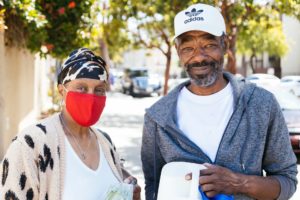
She also shared that food from the pantry is helping her stay fit “just by changing my diet, and the way that I prepare food for myself. I love mushrooms and fresh vegetables – they’re actually things that I can use at home. The add-on items are just what I need.”
Looking Forward
What’s next for the CROps pilot? Food Bank staff will be evaluating the feedback from participants to learn more about participants’ preferences, and how best to continue providing more choice and culturally responsive foods that folks want and enjoy cooking. Through this feedback loop, we hope to continue an ongoing dialogue with participants about how we can offer more options they want and are looking for through our pantry network.



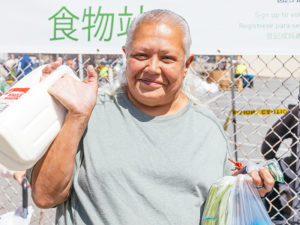 the past 40 years, and understandably, she’s seen the city change a lot in her time here. “When I came here [in the 80s], you could buy a thousand wonders for $50. You could fill the refrigerator for at least a month [for $50]. Now, everything is so expensive. There are times when there’s not enough to buy food. It’s terrible.”
the past 40 years, and understandably, she’s seen the city change a lot in her time here. “When I came here [in the 80s], you could buy a thousand wonders for $50. You could fill the refrigerator for at least a month [for $50]. Now, everything is so expensive. There are times when there’s not enough to buy food. It’s terrible.” 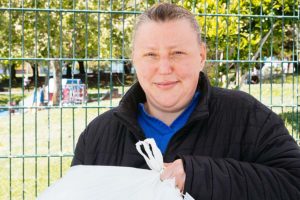 now, Anna is working anywhere from six to seven days a week as a nurse at Highland Hospital, and teaching UCSF nursing students as well. She stops by Cesar Chavez Pop-up Pantry to pick up food for her parents on her one day off.
now, Anna is working anywhere from six to seven days a week as a nurse at Highland Hospital, and teaching UCSF nursing students as well. She stops by Cesar Chavez Pop-up Pantry to pick up food for her parents on her one day off. 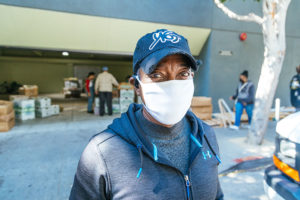 L
L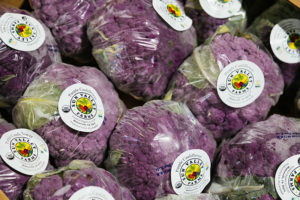 delivering more than nutrition to their parish. SFAAFBC’s holistic approach allows them to target the root causes of food insecurity by caring for the whole person.
delivering more than nutrition to their parish. SFAAFBC’s holistic approach allows them to target the root causes of food insecurity by caring for the whole person.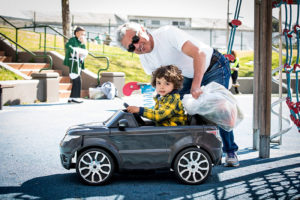 Other parents are more hesitant to let go of remote or homeschooling. Farzad is the single dad of 3-year-old Mehdi, as well as a musician, small business-owner, and participant at Cesar Chavez Pop-up Pantry. Farzad watches his son drive a toy car around the playground and sighs, shaking his head when asked about in-person preschool. He doesn’t “want Mehdi to go until COVID is over,” citing health concerns like maskless and unvaccinated children.
Other parents are more hesitant to let go of remote or homeschooling. Farzad is the single dad of 3-year-old Mehdi, as well as a musician, small business-owner, and participant at Cesar Chavez Pop-up Pantry. Farzad watches his son drive a toy car around the playground and sighs, shaking his head when asked about in-person preschool. He doesn’t “want Mehdi to go until COVID is over,” citing health concerns like maskless and unvaccinated children. 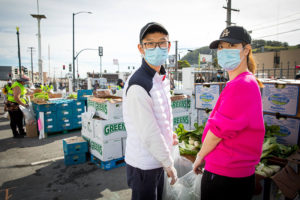 Wei Zong join other participant-volunteers in providing healthy groceries to their neighbors while also receiving food assistance themselves. For Jiakuang and his family, Thursday mornings at Cornerstone have been a time not only to receive and distribute food, but to mingle, talk, and laugh with other volunteers and food bankers.
Wei Zong join other participant-volunteers in providing healthy groceries to their neighbors while also receiving food assistance themselves. For Jiakuang and his family, Thursday mornings at Cornerstone have been a time not only to receive and distribute food, but to mingle, talk, and laugh with other volunteers and food bankers.
Share